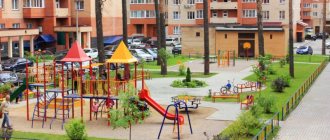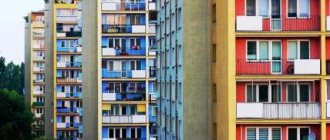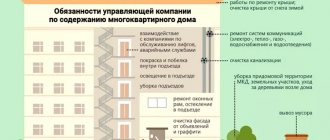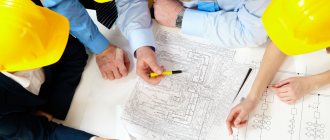Restoration of emergency load-bearing structures
The owner of a residential premises in an apartment building appealed to the court with a request to oblige the management organization to restore the destroyed balcony slab and install a drain from the roof of the house. However, it was not possible to get what I wanted the first time.
The management organization in court provided evidence of the impossibility of fulfilling the owner’s demand without holding a general meeting. She referred to the fact that the repair of floors is a major repair, which requires a decision of the general meeting of owners and their additional funds.
The first court in this case found such arguments convincing, but the appellate court did not agree with them. He pointed out that, according to the management agreement, the common property of the apartment building must be maintained in accordance with clause 10 of section. 2 of the Decree of the Government of the Russian Federation of August 13, 2006 No. 491, including should not threaten the safety of life and health of citizens.
The Court of Appeal indicated that the absence of a decision of the general meeting of owners does not relieve the management organization from liability for improper maintenance of the common property of the apartment building. The court decided that the management organization must:
- pay the owner compensation for moral damage in the amount of 20,000 rubles,
- carry out work to restore the destroyed balcony slab.
New rules for the operation of the emergency dispatch service in the apartment building
1474629
Is there liability for improper maintenance of common property in an apartment building?
According to Article 161 of the Housing Code of the Russian Federation (hereinafter referred to as the Housing Code of the Russian Federation), the management of an apartment building must ensure favorable and safe living conditions for citizens, proper maintenance of common property in an apartment building, resolving issues regarding the use of said property, as well as the provision of utilities to citizens living in such a building.
Proper maintenance of the common property of the owners of premises in an apartment building must be carried out in accordance with the requirements of the legislation of the Russian Federation, including in the field of ensuring the sanitary and epidemiological well-being of the population, on technical regulation, fire safety, consumer rights protection, and must ensure:
- compliance with the requirements for the reliability and safety of an apartment building;
- safety of life and health of citizens, property of individuals, property of legal entities, state and municipal property;
- availability of use of premises and other property included in the common property of premises owners in an apartment building;
- compliance with the rights and legitimate interests of the owners of premises in an apartment building, as well as other persons;
- constant readiness of utilities, metering devices and other equipment that are part of the common property of the owners of premises in an apartment building, to supply the resources necessary to provide utilities to citizens living in an apartment building, in accordance with the rules for the provision, suspension and limitation of the provision of utilities services to owners and users of premises in apartment buildings and residential buildings, established by the Government of the Russian Federation.
Decree of the Government of the Russian Federation dated August 13, 2006 No. 491 approved the Rules for the maintenance of common property in an apartment building (hereinafter referred to as the Rules). The rules regulate relations regarding the maintenance of common property owned by the right of common shared ownership to the owners of premises in an apartment building (hereinafter referred to as common property). The common property includes:
a) premises in an apartment building that are not parts of apartments and are intended to serve more than one residential and (or) non-residential premises in this apartment building (hereinafter referred to as common areas), including inter-apartment landings, stairs, elevators, elevators and others shafts, corridors, strollers, attics, technical floors (including built-in garages and areas for vehicles, workshops, technical attics built at the expense of the owners of the premises) and technical basements in which there are utilities, otherwise serving more than one residential and (or) non-residential premises in an apartment building equipment (including boiler rooms, boiler rooms, elevator units and other engineering equipment);
b) roofs;
c) enclosing load-bearing structures of an apartment building (including foundations, load-bearing walls, floor slabs, balcony and other slabs, load-bearing columns and other enclosing load-bearing structures);
d) enclosing non-load-bearing structures of an apartment building serving more than one residential and (or) non-residential premises (including windows and doors of common areas, railings, parapets and other enclosing non-load-bearing structures);
e) mechanical, electrical, sanitary and other equipment, including structures and (or) other equipment designed to ensure unimpeded access for people with disabilities to the premises of an apartment building (hereinafter referred to as equipment for people with disabilities and other low-mobility groups), located in an apartment building house outside or inside the premises and serving more than one residential and (or) non-residential premises (apartment);
f) a land plot on which an apartment building is located and the boundaries of which are determined on the basis of state cadastral registration data, with elements of landscaping and landscaping;
g) other facilities intended for the maintenance, operation and improvement of an apartment building, including transformer substations, heating points intended to serve one apartment building, collective parking lots, garages, children's and sports grounds located within the boundaries of the land plot on which the apartment building is located .
Proper maintenance of common property in a multi-apartment residential building is ensured by the owners of the premises, the homeowners' association, housing, housing-construction cooperative or other specialized consumer cooperative.
Management organizations and persons providing services and performing work during the direct management of an apartment building are responsible to the owners of the premises for violation of their obligations and are responsible for improper maintenance of common property in accordance with the legislation of the Russian Federation and the agreement on the management of an apartment building. The rules provide for state control over the maintenance of common property, which is carried out by federal executive authorities and executive authorities of constituent entities of the Russian Federation within the limits of their competence in accordance with the legislation of the Russian Federation.
State Housing Inspectorate of the Omsk Region (hereinafter referred to as the Inspectorate), located at st. Bulatova, 68, is an authorized executive body of the Omsk region, exercising regional state housing supervision in the Omsk region.
The inspectorate carries out the functions of housing supervision, namely: prevention, detection and suppression of violations by state authorities, local governments, as well as legal entities, individual entrepreneurs and citizens established in accordance with housing legislation, legislation on energy saving and on increasing energy efficiency of the requirements for use and the safety of the housing stock, regardless of its form of ownership, including requirements for the use and maintenance of common property of premises owners in apartment buildings.
Inspection based on the results of inspections:
- issues orders to stop violations of mandatory requirements, to eliminate identified violations, and to take measures to ensure compliance with mandatory requirements;
- draws up protocols on administrative offenses related to violations of mandatory requirements, considers cases of these administrative offenses and takes measures to prevent such violations;
- sends materials related to violations of mandatory requirements to the authorized bodies to resolve issues of initiating criminal cases based on crimes.
The Code of the Russian Federation on Administrative Liability (hereinafter referred to as the Administrative Code of the Russian Federation) provides for administrative liability for improper maintenance of common property in an apartment building.
In particular, Article 7.22 of the Code of Administrative Offenses of the Russian Federation for violation by persons responsible for the maintenance of residential buildings and (or) residential premises of the rules for the maintenance and repair of residential buildings and (or) residential premises, provides for administrative liability in the form of imposing an administrative fine on officials in the amount of four thousand to five thousand rubles; for legal entities - from forty thousand to fifty thousand rubles.
In addition, Article 32 of the Code of the Omsk Region on Administrative Offenses for violation of the rules, norms, requirements established by local government bodies of the Omsk Region to ensure cleanliness and order in the public areas of municipalities of the Omsk Region, as well as rules for the maintenance of objects located in these territories, also administrative liability is provided in the form of a warning or the imposition of an administrative fine on citizens in the amount of one thousand to five thousand rubles; for officials - from five thousand to twenty thousand rubles; for legal entities - from ten thousand to one hundred thousand rubles.
Chief Specialist of the Control and Legal Department of the Oktyabrsky District Administration Angela Azarova
Flooding of the apartment due to the fault of the management organization
The residents' apartment was flooded for five years, as a result of which they had to regularly make repairs in the kitchen, hallway and balcony. The owners wrote complaints to the management organization, but floods happened again and again.
Then they went to court to prove that the management organization was not taking necessary and sufficient measures to prevent roof leaks above their apartment and was not providing the services provided for in the management agreement.
In court, the owners of the premises asked to recover from the management organization:
- material damage,
- compensation for moral damage,
- penalty for improper maintenance of the common property of the apartment building,
- expenses for damage assessment,
- expenses for legal services,
- fine for failure to meet consumer requirements voluntarily.
There were two courts that only partially satisfied the applicants' demands. The courts decided not to collect a penalty from the management organization for improper maintenance of the common property of the apartment building and reduced the amount of material damage, the fine for failure to voluntarily satisfy consumer requirements and the costs of paying for the services of a representative.
How can an agency prepare for fire safety requirements testing?
88990
No hot water for more than two weeks
In accordance with clause 3.1.11 of SanPiN 2.1.4.2496-09, during preventive maintenance, shutdown of hot water supply systems should not exceed 14 days.
The shutdown of hot water for about six months led to litigation. A resident of an apartment building went to court for compensation of 10,000 rubles from the provider of the hot water supply utility service.
The management organization presented its arguments: turning off the water for 14 days was allowed to carry out preventive repairs, but it carried out major repairs of heating networks and did not charge the owners for hot water supply for six months.
The court considered the MA's arguments insufficient to reject the claim: the management organization violated the rights of residents to provide public services.
However, there were no serious consequences for the owner as a result of the actions of the management organization. Therefore, the amount of moral compensation was 1,000 rubles.
How foreign management organizations manage apartment buildings
69183
Responsibility of the management company
The duties of the management company and its responsibilities are also reflected in the Rules for the provision of utility services. They establish the responsibility of housing and communal services authorities for poor quality provision of utility services and failure to perform the work assigned to them, both by contract and by the legislation of the Russian Federation.
- If facts of improper maintenance of the property of the owners are revealed, the legal organization can say goodbye to 50 thousand rubles. If a violation of the standard for providing residents with resources was detected, the fine will be 10 thousand rubles.
- Article 44 of the Civil Code of the Russian Federation establishes liability for actions or inactions of authorized persons that led to damage to common property and harm. In this case, all losses incurred by the residents are transferred to the management company.
- Violation of fire safety rules may result in administrative liability. In this case, the management company will lose up to 200 thousand rubles.
This is important to know: Common property of an apartment building: list according to the Housing Code of the Russian Federation
The list of work that is the responsibility of the management company is very large. Their knowledge will help relieve tension between residents and housing and communal services representatives.
Violation of the temperature regime in the apartment
The heating distribution system in the apartment building was overhauled: metal pipes were replaced with plastic ones and the cross-section of the pipes in the entrances was reduced. After such repairs, the temperature in the apartments of the outer entrances of the building decreased.
The owners of premises in the apartment building wrote appeals to the management organization with requests to resolve the issue, but the management office did not respond. Then one of them went to court with a demand to ensure the thermal conditions in the corner apartments in accordance with sanitary standards and to recover compensation for moral damages from the management organization.
The court satisfied the demands of the owner of the premises and ordered the management organization to pay moral damages.
How can a management company prepare for the heating season?
120880
Improper garbage disposal
The owner of a premises in an apartment building went to court: he demanded to recover 100,000 rubles from the management organization for the fact that for several years it provided poor quality services for the maintenance of common property and did not remove garbage from container sites.
During the court hearing, it turned out that Rospotrebnadzor had repeatedly brought the management organization and its director to administrative liability under Art. 8.2 of the Code of Administrative Offenses of the Russian Federation for neglecting her duty to remove garbage and clean container sites on a daily basis. In addition, the MA did not have certificates of work performed.
The court found that despite the fines, the situation with garbage removal did not improve, and the management organization issued monthly receipts to the owners for housing and communal services, including the removal of solid waste.
Inclusion in the receipt for payment of utilities the cost of a service that was provided poorly is a violation of consumer rights, entailing the responsibility of the contractor and, as a consequence, compensation for moral damage on the basis of Art. 15 of the Law of the Russian Federation dated 02/07/1992 No. 2300-1.
Taking into account the reasonableness of the requirements, the court partially satisfied the owner’s demands and recovered 1,500 rubles from the management organization.
Functions
Having dealt with all the laws and regulations that establish the rights and obligations of the management company , it is worth clearly understanding what is still included in the organization’s obligations and what is not :
- Service
The responsibilities of the management company include hiring organizations that specialize in such activities. When hiring, the company enters into a contract with her.
The management company is not obliged to carry out this activity. She only hires a service company and controls its work in a particular house.
This is important to know: How to invalidate the minutes of the general meeting of owners
Repair work
This obligation is specified in the management agreement and in Article 161 . The management company is obliged to carry out work to preserve the condition of a particular property and improve .
This item also includes:
- Control over the provision of public services ;
- Control over their payment ;
- Organization of repair work ;
- Maintaining the safety and security of an apartment building.
- Public utilities
The management company must provide residents with utility services by concluding contracts with resource supply organizations, monitor their quality and timely payment .
We recommend reading the article on how to correctly recalculate utility bills during your absence.
Caring for the local area
The organization must monitor the local area , as well as carry out cleaning , landscaping and improvement . This is governed by the terms of the agreement between the residents and the management company . Technical control
The organization is obliged to monitor the quality of operation of metering devices , other equipment and communications systems . It is also necessary to carry out their repairs and other work aimed at maintaining them in proper condition . Recalculation
Recalculation is more a right than an obligation of the management company. However, the organization is still obliged to recalculate tariffs and the cost of services provided to residents . Financial support
The management company can and should receive financial support for carrying out repairs and maintenance of the common property of apartment owners. the residents themselves provide such funds .
to contents





